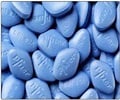Experiments on animals conducted by Johns Hopkins and other researchers have confirmed that the erectile dysfunction drug called Viagra amplifies the effects of a heart-protective protein.
Experiments on animals conducted by Johns Hopkins and other researchers have confirmed that the erectile dysfunction drug called Viagra amplifies the effects of a heart-protective protein.
Reporting their findings in the online edition of the Journal of Clinical Investigation, the researchers have said that their study helps explain why Viagra, scientifically known as sildenafil, has already been shown to improve heart function.They said that their findings also went to suggest that one day Viagra might have value in either treating or preventing heart damage due to chronic high blood pressure.
The researchers revealed that the key is Viagra's effects on a single protein called RGS2, which is an essential link in the chain reactions that initially protect the body's main blood-pumping organ from spiralling into heart failure.
While experimenting with mice, the researchers first observed that after a week of induced high blood pressure, the hearts of animals engineered to lack RGS2, or regulator of G-protein signaling 2, quickly expanded in weight by 90 percent.
The researchers revealed that about 50 percent of the mice died of heart failure.
In mice with RGS2, by contrast, the dangerous muscle expansion called hypertrophy was delayed, growing only 30 percent, and no mice died.
When hypertensive mice with RGS2 were treated with Viagra in subsequent tests, they showed enhanced buffering, with less hypertrophy, stronger heart muscle contraction and relaxation, and as much as 10 times lower stress-related enzyme activity compared to their untreated counterparts.
In mice lacking RGS2, Viagra had no effect.
"Sildenafil clearly prolongs the protective effects of RGS2 in mouse hearts," says study senior investigator and cardiologist Dr. David Kass, a professor at the Johns Hopkins University School of Medicine and its Heart and Vascular Institute.
According to Kass, RGS2 is stimulated by an enzyme, protein kinase G, whose action is, in turn, raised by countering the activity of another enzyme, phosphodiesterase 5 (PDE5A).
He and his team has already shown in 2005 that Viagra's ability to block PDE5A is responsible for blunting hypertrophy due to high blood pressure in mice and offsetting similar, adrenaline-stimulated heart stress in people.
Kass says that RGS2 "acts like a short-term reset mechanism in the heart," recoupling G proteins that if left alone stimulate the heart's response to high blood pressure. And without the "reset," a cascade of reactions known as Gq signalling leads to scar tissue formation, hypertrophy and heart failure.
"The evidence is piling up that unbridled Gq signaling is driving a central biological chain reaction in heart failure, and that by extending the protective effects of RGS2 or by developing a test for its presence, researchers can develop new therapies or improve existing ones, including ACE inhibitors and possibly sildenafil, for people with heart failure who will benefit most," says Kass.
Source-ANI
SK















